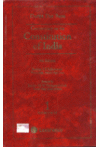- Author(s): Justice S.S. Subramani, Durga Das Basu
- Publisher: LexisNexis
- Edition: 9 Ed 2014
- ISBN 13 9789351431008
- Approx. Pages 1021 + contents
- Delivery Time 3-5 working days (within Kerala & South India) (Others 7-9 days)
.............................................................................................................................
Description
This statement effectively means that the last word on Constitutionality is by the Judges. It implies that Judges are free to read the Constitution and adapt it as it pleases them. It contains only a kernel of the truth. However, somewhat exaggerated, the facts are that the Courts do play an important role in governing our nation because they play a central role in the interpre¬tation of the Constitution. Judges make law. This is clearly laid down by our Supreme Court in Raghubhir Singh.' Under Article 141 of our Constitution, the law declared by the Supreme Court is binding on all courts, and this in effect becomes the law of the land. But the study of the Constitution involves much more than an examination of its judicial interpretation. The Constitution is not simply what the Supreme Court says it is. Its words are not so many empty vessels into which Justices can pour meaning. The original understanding of the founding generation is one source to understand the Constitution. Another equally indispensable source is of course, the Supreme Court, whose decisions have influenced so profoundly our under-standing of the Constitution and its principles. The judges of the Supreme Court, while interpreting the Constitution, have also taken into account the aim and spirit of the Constitu¬tion. As stated by Granville Austin, the Indian Constitution is first and foremost a social document.2 Various decisions of the Supreme Court have also explicitly stated so. The interpretation now given to Fundamental Rights and the Directive Principles of State Policy and how they can go together, is a clear example. The jurisdiction of the Supreme Court to declare what is law is unlimited and it extends to all spheres. Naturally there is no subject which has not been dealt with by the Supreme Court and very often new questions come before it for interpretation, especially relating to the Fundamental Rights chapter of the Con-stitution. New interpretation becomes necessary due to various developments in the State, including social and economic development. Since the Constitution is a living document, new interpretations will be applied according to changing circumstances.
.............................................................................................................................
Contents
Introduction
Appendix to Introduction
The Constitution of India, 1950
Preamble
Part I - The union and its Territory
Article 1. Name and territory of the Union
Article 2. Admission or establishment of new States
Article 2A. [Sikkim to be associated with the union.] Rep. by the Constitution
(Thirty-sixth Amendment) Act, 1975, s.5 (w.e.f.26-4-1975)
Article 3. Formation of new States and alteration of areas, boundaries or
names of existing States
Article 4. Laws made under articles 2 and 3 to provide for the
amendment of the First and
the Fourth Schedules and Supplemental, incidental and
consequential matters
Part II - Citizenship
Article 5. Citizenship at the commencement of the Constitution
Article 6. Rights of citizenship of certain persons who have migrated
to India from Pakistan
Article 7. Rights of citizenship of certain migrants to Pakistan
Article 8. Rights of citizenship of certain persons of Indian origin
outside India
Article 9. Persons voluntarily acquiring citizenship of a foreign
State not to be citizens
Article 10. Continuance to the rights of citizenship
Article 11. Parliament to regulate the right of citizenship by law
Part III - Fundamental rights
General
Article 12. Definition
.............................................................................................................................
Author Details
Author – Acharya Dr. Durga Das Basu, M.A., LL.D. (Cal.); D. Litt. (Cal. Burd.);
Rabindrabharti; Kalyani); Saraswati, Vachaspati, Vidyavaridhi, Prajnabharati,
Nyayaratnakara, Neetibhaskara, Nyayabharati, Manava Ratna. Honorary
Professor, Banaras Hindu University; Retired Judge, High Court, Calcutta;
Formerly Member, Union Law Commission; Tagore Law Professor, Asutosh
Memorial Lecturer. Calcutta University; Recipient, National Award, Padmabhushan
(1985); National Research Professor of India (1986); National Citizen’s Award (1991);
Honorary Fellow, Asiatic Society, Calcutta (1994).
Eighth Edition Revised by
Hon’ble Mr. Justice S.S. Subbramani, Judge (Retired) High Court, Madras
.............................................................................................................................

